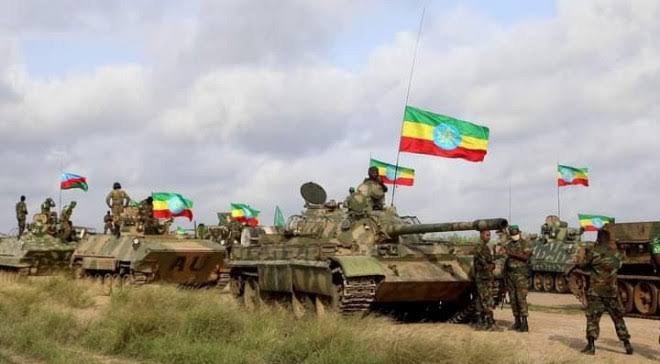Facebook Twitter (X) Instagram Somali Magazine - People's Magazine
The Ethiopian military has shut down its border with the Somaliland region following intense fighting between Somali regional forces and armed militias in the Harshin district of Ethiopia’s Somali Region. The escalation, which began on Tuesday morning in the rural area of Dacawaley, has led to mounting tensions and casualties on both sides.
Border Closure Amid Rising Violence
The Ethiopian military implemented the border closure as clashes intensified between regional troops and militias. Security forces in the Somali Region have urged civilians to remain indoors and avoid providing shelter to militia members as violence threatens to destabilize the region.
Authorities have deployed additional forces to the conflict zones to prevent the violence from spreading further and to restore order.
Clashes Erupt After Targeted Killing
The conflict reportedly began with the killing of the Yocole district’s security chief and his two bodyguards in a rural area between Dacawaley and Duudbaydale. The targeted attack sparked immediate retaliation, leading to fierce battles between Somali regional troops and armed groups.
A delegation sent to investigate and mediate the situation was also ambushed by gunmen, according to the Somali Regional State Security Office. This further escalated tensions, prompting a stronger military response.
Casualties and Ongoing Threats
Preliminary reports suggest that there have been casualties on both sides, though exact figures have not been officially confirmed. Local residents have reported hearing heavy gunfire throughout the area, adding to fears of civilian harm.
The Ethiopian military has heightened security measures in affected regions, urging residents to stay away from conflict zones. Authorities are also investigating whether external forces are influencing the armed militias.
Impact on Somaliland Relations
The closure of the Ethiopian-Somaliland border adds another layer of complexity to relations between Ethiopia and Somaliland. The move is seen as a security precaution to prevent the conflict from spilling over into Somaliland’s territory.
Somaliland, a self-declared independent region, has long maintained tense relations with both Ethiopia and Somalia over territorial disputes and sovereignty claims. The recent clashes highlight the fragility of peace in the Horn of Africa and the challenges of addressing inter-regional violence.
Security Agencies Respond
The Somali Regional State Security Office has emphasized the importance of community cooperation in identifying and isolating militia members. Local leaders have been called upon to mediate and assist in diffusing tensions.
“We are taking all necessary measures to protect civilians and restore peace in the region,” the office stated.
Regional Implications
The ongoing violence poses a threat to the stability of the Somali Region, a critical area for Ethiopia’s security and economic development. The region serves as a key trade and transportation hub, making its security vital for the country’s overall stability.
The border closure with Somaliland could also have economic consequences, potentially disrupting trade routes and increasing tensions between neighboring territories.
Way Forward
As authorities work to stabilize the situation, calls for peaceful dialogue have emerged. Observers stress the importance of addressing the root causes of the conflict, including grievances related to governance and resource allocation.
The Ethiopian government has pledged to investigate the circumstances surrounding the killing of the Yocole security chief and take steps to prevent further violence. However, restoring lasting peace will require collaboration between regional leaders, community stakeholders, and national authorities.

